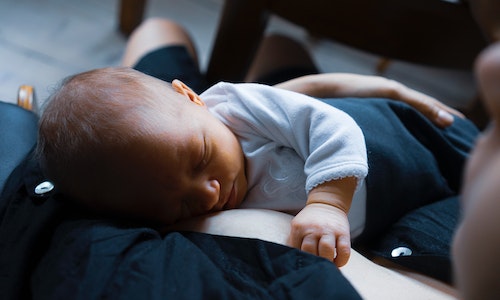There are several benefits of this sleeping position but they come with some risks you need to mitigate.
As a new parent, I soon came to wonder about the benefits of baby sleeping on tummy on my chest.
This started from the biggest pain point at that time – our daughter had colics from the second week of life.
Getting her to sleep was an exhausting process (1 hour+) sprinkled with holding her in my arms, singing to her, putting her in the crib, back in my arms, and repeating.
After doing some research, I found that this sleeping position can benefit the baby.
But what exactly are the advantages of having a baby sleep on a parent’s chest?
First and foremost, having the baby sleep on their tummy on a parent’s chest helps create a sense of security and contentment for the little one.
They can hear their parent’s heartbeat, which can regulate their breathing.
Feeling their warmth also creates a calming environment.
This stimulates the release of oxytocin, the “cuddle hormone”, which helps the baby and parent feel at peace while promoting bonding and attachment.
Furthermore, this sleeping position can aid in developing strong head and neck muscles for the baby, and may even alleviate gas and colic discomfort.
It appears this connection is stronger with the mom (surprise) in the early days of life.
Nevertheless, Anastasia and I connected well.
She felt at peace on my chest and her mother’s alike.
Below, we’ll dive deeper into:
- the various benefits of having a baby sleep on a parent’s chest
- safety concerns
- most frequently asked questions
So, whether you’re a new parent like us or curious about the subject, stay tuned for engaging and informative material!
7 Benefits Of Baby Sleeping On Parent’s Chest
The skin-to-skin contact offers countless benefits when the baby sleeps on your chest.
The most important are:
Stabilizes breathing and heart rate
Chest sleeping (skin-to-skin contact ideally) helps stabilize a newborn’s breathing and heart rate, which can be especially beneficial for premature babies.
Studies have shown that 75% of heart and breathing episodes are reduced using skin-to-skin contact.
Reduces stress
This position can help reduce a baby’s level of stress hormones, which can lead to a more relaxed and calm baby.
Promotes breastfeeding
Skin-to-skin contact can increase a mother’s milk production and help babies latch on and breastfeed more successfully.
Boosts immunity
The beneficial bacteria found on the parent’s skin can be transferred to the baby during skin-to-skin contact, helping to boost the baby’s immune system.
Improves sleep
This approach can help babies sleep more soundly and for longer periods, which is beneficial for their growth and development.
Enhances bonding
Promotes bonding between the parent and the baby, which can lead to a stronger emotional connection and a more positive parent-child relationship.
Reduces discomfort (pain) and crying
Pain is reduced through skin-to-skin contact, and consequently, the babies cry less often.
Researchers have found that newborns who had more skin-to-skin contact cried less.
It may even alleviate gas and colic discomfort.

For us, it did wonders for the colics.
Not that it worked, it was the only thing that worked during the 9 (yes NINE) months we struggled with this.
And it was FREE.
Unfortunately, we spent some money before finding this solution on all dedicated products like Gripe Water.
Thousands of parents swear the gripe water did wonders.
Unfortunately, we had to be the exception.
Safety Considerations
Although the benefits of baby sleeping on tummy on my chest were indisputable, I also did my homework regarding the process’s safety.
First, it’s essential to be aware of the safety considerations and follow the American Academy of Pediatrics (AAP) guidelines for safe sleep.
The AAP recommends placing babies on their backs for every sleep until they’re at least 1 year old.
This helps reduce the risk of Sudden Infant Death Syndrome (SIDS).
Nonetheless, check out the main things you need to consider when the baby sleeps on your chest.

Stay awake
The rule of thumb for a baby sleeping on your chest is that only the baby sleeps.
You must stay awake and alert to ensure their safety.
If you feel drowsy or there’s a chance that you could fall asleep, transfer your baby to its sleep surface, like a bassinet or crib.
Ideally, have a second pair of eyes supervising you.
Overheating
When your baby sleeps on your chest, be aware of the potential risks of overheating.
You’ll do some trial and error at first.
What you could do:
- Ensure the room temperature is comfortable (not too hot or cold) – our pediatrician recommended between 18°C/64.4°F and 21°C/69.8°F
- Dress your baby in light, breathable clothing – during summer we kept only her diaper on
- Avoid bundling your baby in thick swaddles – we never used swaddles
In our case, the colder it was, the better she was sleeping.
Still valid today, therefore all our friends complain about the freezing temperatures in our apartment, never above 21°C/69.8°F.
Suffocation
To prevent suffocation, consider these precautions:
- Keep your baby’s face clear of fabric, including your clothing or bedding – except in winter, we did this topless because we generate a lot of heat when dressed up
- Ensure your baby’s nose and mouth aren’t obstructed by (parts of) your body or their own limbs – being skinny comes in handy
- Regularly check for any signs of distress or difficulty breathing – hence the mention about staying awake
By following these safety guidelines and being aware of the potential risks, you can ensure that your baby gets the benefits of sleeping on your chest while prioritizing their safety and well-being.
FAQ
Is it OK to let the baby sleep on my chest?
In the end, it’s up to you to decide.
Based on the safety considerations from above and personal experience, I don’t see why not.
I discussed the topic with our pediatrician and she agreed that is unlikely to expose the baby to any risks – she gave me those 3 points above about what we need to be careful of.
But just to be clear, this should never replace the standard process of the baby sleeping on their back in the bassinet or crib until the age of 1, as recommended by all experts.
We did it 1-2 times a day in the first months, and then now and then when Anastasia was in big distress because of the colics.
Why do babies like to sleep on your chest?
In our experience, babies feel comforted by the sound of their heartbeat and enjoy the warmth and closeness they experience when sleeping on their chest.
They heard a heartbeat for several months and then suddenly it stopped.
No surprise, they will prefer to hear it again.
This close contact also helps babies feel connected and secure.
Why do babies sleep better on moms’ chests?
Babies often sleep better on their mothers’ chests because mothers can provide a familiar scent, warmth, and security they experienced while in the womb.
Plus, hearing the mom’s heartbeat can be soothing for babies, making them sleep more peacefully.
How long can the baby sleep on my chest?
While there isn’t a specific time limit for babies to sleep on your chest, it’s essential to ensure that your little one doesn’t spend their entire sleep on your chest.
This could make it difficult for them to transition to sleeping independently.
Monitor the situation and adjust according to your baby’s comfort and safety.
Does baby laying on mom’s chest count as tummy time?
Tummy time refers to supervised, awake periods when a baby lies on their belly to strengthen their neck, shoulder, back, and arm muscles.
So if the baby is lying, awake, and active, yes it does.
If the baby is sleeping, not so much because there is no activity from his side.
Is the baby sleeping on my chest a risk for SIDS?
The American Academy of Pediatrics recommends babies sleep on their backs to minimize the risk of SIDS.
However, if you are awake, alert, and closely monitoring your baby while they sleep on your chest, the risk can be minimized.
It’s important to discuss this practice with your healthcare provider for personalized guidance.
Does a baby with reflux benefit from sleeping on my chest?
If your baby has reflux, they may find some relief when sleeping on your chest, as this position can help gravity keep stomach contents down.
However, it’s important to consult your pediatrician to address reflux issues and discuss the best sleep positions for your baby.

Key Takeaways
As parents, we found that having our baby sleep on our chest offered many benefits.
We had concerns and fears but we managed to overcome them and always stayed alert.
Several sources (listed below) confirm that allowing a newborn to sleep on a parent’s chest can be beneficial as long the parent is not asleep.
Close or skin-to-skin contact can result in:
- enhanced bonding and attachment
- calming and secure environment
- better breathing and heartbeat regulation
- and more
As long as the safety precautions were followed, the benefits of baby sleeping on tummy on my chest were undeniable.
If you have any questions, tips, curiosities, or experiences to share, please use the comments section below.
Until next time, I wish you good health, and may the best decisions nest in your mind.
Resources:
- http://www.sleepflorida.org/benefits-of-baby-sleeping-on-tummy-on-my-chest
- https://safetosleep.nichd.nih.gov/safesleepbasics/about
- https://www.romper.com/life/is-it-safe-for-a-newborn-to-sleep-on-my-chest-the-one-thing-to-consider-before-trying-it-48817
- https://parentswonder.com/baby-sleep-on-chest
- https://www.healthline.com/health/baby/baby-sleeping-on-stomach

